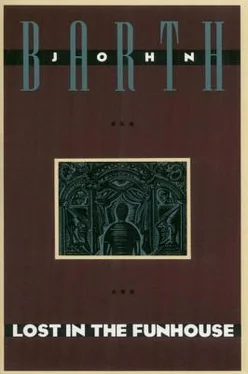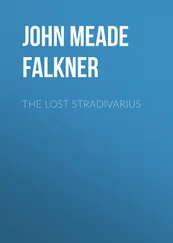John Barth - Lost in the Funhouse
Здесь есть возможность читать онлайн «John Barth - Lost in the Funhouse» весь текст электронной книги совершенно бесплатно (целиком полную версию без сокращений). В некоторых случаях можно слушать аудио, скачать через торрент в формате fb2 и присутствует краткое содержание. Год выпуска: 2014, ISBN: 2014, Издательство: Knopf Doubleday Publishing Group, Жанр: Современная проза, на английском языке. Описание произведения, (предисловие) а так же отзывы посетителей доступны на портале библиотеки ЛибКат.
- Название:Lost in the Funhouse
- Автор:
- Издательство:Knopf Doubleday Publishing Group
- Жанр:
- Год:2014
- ISBN:978-0-8041-5250-1
- Рейтинг книги:3 / 5. Голосов: 1
-
Избранное:Добавить в избранное
- Отзывы:
-
Ваша оценка:
- 60
- 1
- 2
- 3
- 4
- 5
Lost in the Funhouse: краткое содержание, описание и аннотация
Предлагаем к чтению аннотацию, описание, краткое содержание или предисловие (зависит от того, что написал сам автор книги «Lost in the Funhouse»). Если вы не нашли необходимую информацию о книге — напишите в комментариях, мы постараемся отыскать её.
Lost in the Funhouse — читать онлайн бесплатно полную книгу (весь текст) целиком
Ниже представлен текст книги, разбитый по страницам. Система сохранения места последней прочитанной страницы, позволяет с удобством читать онлайн бесплатно книгу «Lost in the Funhouse», без необходимости каждый раз заново искать на чём Вы остановились. Поставьте закладку, и сможете в любой момент перейти на страницу, на которой закончили чтение.
Интервал:
Закладка:
And to get it all out of and back into one jug, on a single skin! Every detail would need be right, if I was to achieve the effects of epic amplitude and lyric terseness, the energy of innocence and experience’s restraint. Adversity generates guileful art: months I spent considering and rejecting forms, subjects, viewpoints, and the rest, while I fashioned trap after trap for Helen and sang bait-songs of my plans — both in vain. Always she danced and bleated out of reach, sometimes so far away I confused her with the perchèd gulls or light-glints on the rock, sometimes so near I saw her black eyes’ sparkle and the gray-pink cartography of her udder. Now and then she’d vanish for days together; I’d imagine her devoured by birds, fallen to the fishes, or merely uncapturable, and sink into despondencies more sore than any I’d known. My “Anonymiad,” too, I would reflect then (so I began to think of it, as lacking a subject and thus a name), was probably impossible, or, what was worse, beyond my talent. Perhaps, I’d tell myself bitterly, it had been written already, even more than once; for all I knew the waters were clogged with its like, a menace to navigation and obstruction on the wide world’s littoral.
I myself may already have written it; cast it forth, put it out of mind, and then picked it up where it washed back to me, having circuited Earth’s countries or my mere island. I yearned to be relieved of myself: by heart failure, bolt from Zeus, voice from heaven. None forthcoming, I’d relapse into numbness, as if, having abandoned song for speech, I meant now to give up language altogether and float voiceless in the wash of time like an amphora in the sea, my vision bottled. This anesthesia proved my physician, gradually curing me of self-pity. Anon Helen’s distant call would put off my torpor; I resumed the pursuit, intently, thoughtfully — but more and more detached from final concern for its success.
For just this reason, maybe, I came at last one evening to my first certainty about the projected work: that it would be written from my only valid point of view, first person anonymous. At that moment Anonymiad became its proper name. At that moment also, singing delightedly my news, I stumbled into one of the holes I’d dug for Helen. With the curiosity of her species she returned at once down the path wherealong I’d stalked her, to see why I’d abandoned the hunt. Indeed, as if to verify that I was trapped or dead, she peered into my pit. But I was only smiling, and turning on my finger Merope’s ring; when she came to the edge I seized her by the pastern, pulled her in. A shard of deceasèd Thalia, long carried on me, ended her distress, which whooped deaf-heavenward like glee.
TAILPIECE
It had been my plan, while the elements cured her hide, to banquet on Helen’s carcass and drink my fill of long-preserved Calliope. And indeed, for some days after my capture I sated every hunger and slaked every thirst, got drunk and glutted, even, as this work’s headpiece attests. But it was not as it would have been in callower days. My futile seed had soured Calliope, and long pursuit so toughened Helen I’d as well made a meal of my writing-hand. Were it not too late for doubts — and I not flayed and cured myself, by sun, salt, and solitude, past all but the memory of tenderness — I’d wonder whether I should after all have skinned and eaten her, whom too I saw I had misnamed. We could perhaps have been friends, once she overcame her fright; I’d have had someone to talk to when Calliope goes, and with whom to face the unwritable postscript, fast approaching, of my Anonymiad.
Whereto, as I forewarned, there’s no dénouement, only a termination or ironical coda. My scribbling has reached the end of Helen; I’ve emptied Calliope upon the sand. It was my wish to elevate maroonment into a minstrel masterpiece; instead, I see now, I’ve spent my last resources contrariwise, reducing the masterpiece to a chronicle of minstrel misery. Even so, much is left unsaid, much must be blank.
No matter. It is finished, Apollo be praised; there remains but to seal and launch Calliope. Long since I’ve ceased to care whether this is found and read or lost in the belly of a whale. I have no doubt that by the time any translating eyes fall on it I’ll be dust, along with Clytemnestra, Aegisthus, Agamemnon … and Merope, if that was your name, if I haven’t invented you as myself. I could do well by you now, my sweet, to whom this and all its predecessors are a continuing, strange love letter. I wish you were here. The water’s fine; in the intervals of this composition I’ve taught myself to swim, and if some night your voice recalls me, by a new name, I’ll commit myself to it, paddling and resting, drifting like my amphorae, to attain you or to drown.
There, my tale’s afloat. I like to imagine it drifting age after age, while the generations fight, sing, love, expire. Now, perhaps, it bumps the very wharfpiles of Mycenae, where my fatal voyage began. Now it passes a hairsbreadth from the unknown man or woman to whose heart, of all hearts in the world, it could speak fluentest, most balmly — but they’re too preoccupied to reach out to it, and it can’t reach out to them. It drifts away, past Heracles’s pillars, across Oceanus, nudged by great and little fishes, under strange constellations bobbing, bobbing. Towns and statues fall, gods come and go, new worlds and tongues swim into light, old perish. Then it too must perish, with all things deciphered and undeciphered: men and women, stars and sky.
Will anyone have learnt its name? Will everyone? No matter. Upon this noontime of his wasting day, between the night past and the long night to come, a noon beautiful enough to break the heart, on a lorn fair shore a nameless minstrel
Wrote it.
SEVEN ADDITIONAL. AUTHOR’S NOTES (1969)
1) The “Author’s Note” prefatory to the first American edition of this book has been called by some reviewers pretentious. It may seem so, inasmuch as the tapes there alluded to are not at this writing commercially available, may never be, and I judged it distracting to publish the tape-stories in reading-script format. Nevertheless the “Note” means in good faith exactly what it says, both as to the serial nature of the fourteen pieces and as to the ideal media of their presentation: the regnant idea is the unpretentious one of turning as many aspects of the fiction as possible — the structure, the narrative viewpoint, the means of presentation, in some instances the process of composition and/or recitation as well as of reading or listening — into dramatically relevant emblems of the theme.
2) The narrator of “Night-Sea Journey,” quoted from beginning to end by the authorial voice, is not, as many reviewers took him to be, a fish. If he were, their complaint that his eschatological and other speculations are trite would be entirely justified; given his actual nature, they are merely correct, and perhaps illumine certain speculations of Lord Raglan, Carl Jung, and Joseph Campbell.
3) The title “Autobiography” means “self-composition”: the antecedent of the first-person pronoun is not I, but the story, speaking of itself. I am its father; its mother is the recording machine.
4) Inasmuch as the nymph in her ultimate condition repeats the words of others in their own voices, the words of “Echo” on the tape or the page may be regarded validly as hers, Narcissus’s, Tiresias’s, mine, or any combination or series of the four of us’s. Inasmuch as the three mythical principals are all more or less immortal, and Tiresias moreover can see backward and forward in time, the events recounted may be already past, foreseen for the future, or in process of occurring as narrated.
Читать дальшеИнтервал:
Закладка:
Похожие книги на «Lost in the Funhouse»
Представляем Вашему вниманию похожие книги на «Lost in the Funhouse» списком для выбора. Мы отобрали схожую по названию и смыслу литературу в надежде предоставить читателям больше вариантов отыскать новые, интересные, ещё непрочитанные произведения.
Обсуждение, отзывы о книге «Lost in the Funhouse» и просто собственные мнения читателей. Оставьте ваши комментарии, напишите, что Вы думаете о произведении, его смысле или главных героях. Укажите что конкретно понравилось, а что нет, и почему Вы так считаете.












